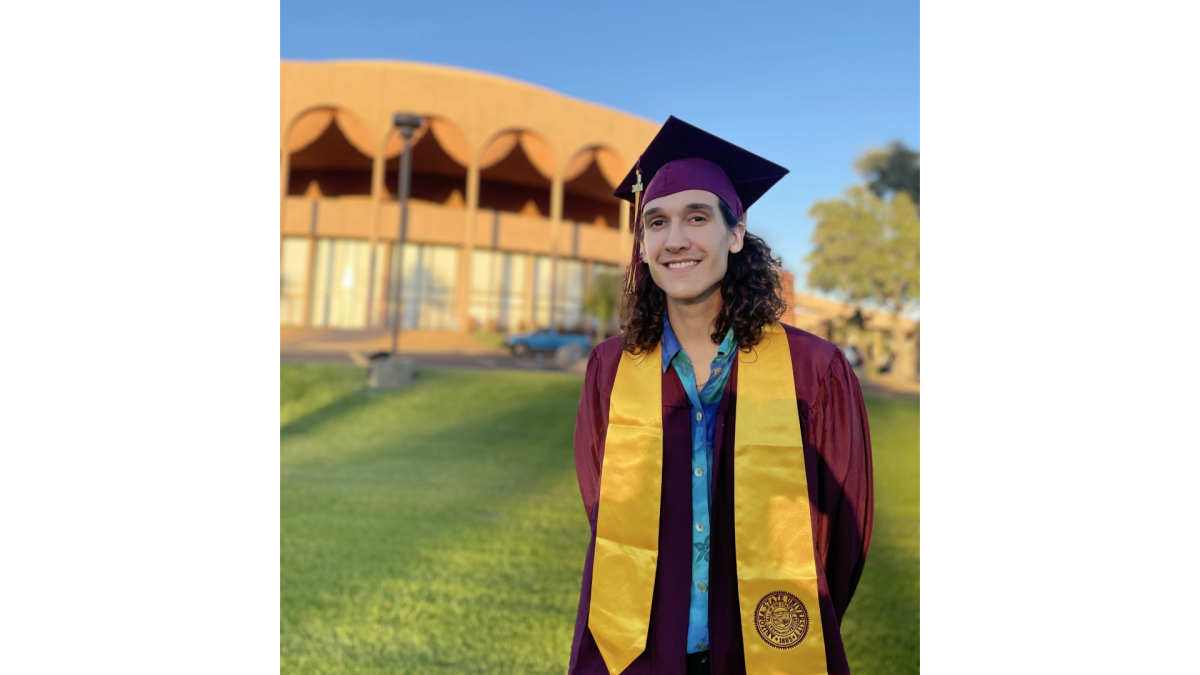Finding his voice: ASU grad takes unexpected turn into sociology

At the suggestion of a roommate, Zachary Cooper (pictured in front of ASU Gammage, where he worked as a senior floor manager) took a sociology course on a whim. What he learned ended up not just changing his academic interests, but his lifelong career goals. Photo courtesy of Zachary Cooper
Editor’s note: This story is part of a series of profiles of notable fall 2024 graduates.
Zachary Cooper, initially a psychology major from Pittsburgh, never imagined that a roommate’s off-the-cuff suggestion would change the trajectory of his academic career. In his junior year at Arizona State University, a roommate recommended he take SOC 101 with Jon McQueen, an instructor in the Sanford School of Social and Family Dynamics.
The course served as a credit toward his psychology degree, so he took it — but what initially fulfilled a requirement soon became a revelation. Cooper found himself captivated by the study of human behavior and society. While presenting a project in another of McQueen’s courses, SOC 340: Social Deviance, he knew sociology would be part of his future career, so he added it as a second major.
“(Sociology) was similar, yet so different from psychology,” he says. “I have never understood a subject like I did sociology, and ever since that class, I’ve wanted to continue learning as much as I can about society and the way that humans work.”
McQueen’s courses were unlike any Cooper had experienced. What he loved most was the focus on active engagement and participation. At first, he felt he had nothing valuable to contribute, so he took an observational approach. But McQueen’s encouragement changed that.
“The class was a safe place, where everyone could learn and get out their perspective and frustrations with the world, and I loved learning from it. The problem was … I had no idea how to contribute and felt like I should just sit and listen to everyone else’s thoughts,” he says. “I talked to Professor McQueen about this and … he was the first professor to say to my face that my perspective mattered.”
Over time, Cooper grew bolder and more outspoken about his beliefs.
“I started small, but it helped me realize that it wasn’t that hard to speak my mind. That’s a lesson that I’ve taken into every other class I’ve been in,” he says. “My perspective matters, and if I don’t share it, no one else will. I think that’s something that anyone could learn from.”
After taking this course, Cooper then joined the Arizona Youth Identity Project as a research assistant studying youth voter behavior and engagement. He also participated in artistic outlets by singing in the Devil Clefs a cappella group and working as a senior floor manager at ASU Gammage.
Now, Cooper plans to take a gap year before pursuing graduate studies. Inspired by McQueen, he hopes to eventually become a professor, but in the meantime his focus is to gain real-world experience, continue his research and embrace opportunities to grow.
We reached out to Cooper to learn more about his journey, his takeaways from ASU and his advice for fellow students preparing for their own futures.
Question: What’s something you learned while at ASU — in the classroom or otherwise — that surprised you or changed your perspective?
Answer: Something that I’ve learned in recent years is that it’s OK to take the extra time for my personal growth. I grew up through high school thinking that I owed everything to those who were kind enough to care about me. I took on other people’s responsibilities and cared so much for everyone in my life, but the older I got, the more I realized there’s no way to manage my life and others’ at the same time. This mentality delayed my individual growth throughout high school, as I was always focused on how others were doing.
Ever since I’ve been in college, however, I’ve been actively trying to allow myself to take that extra time to decompress and grow, no matter how much my people-pleaser tendencies still reappear. I still care about my friends, and mostly, I still feel bad for the relationships that I am not maintaining at every hour of the day. However, with the help of my girlfriend, I’ve realized that this way of thinking is not a realistic expectation of myself. This time in college has taught me that taking care of myself is the only real way of having the mental capacity to maintain these relationships and to look out for my friends when they truly need it.
Q: What’s the best piece of advice you’d give to those still in school?
A: Take your time, realize that this is such an important phase of your life and that it will be over before you know it. At the same time, realize that in the grand scheme of things, you have so much life left. I’m only 22, but with graduation coming up so quickly, I’ve been able to process how fast these last few years have gone by.
I’m glad that I’ve really tried to make every moment count and that I’ve been actively building toward something that I can focus on in the future, but I’m not immune from the occasional sense of nostalgia. I’ve learned that the best way to combat this feeling is to take the moment every so often to observe your surroundings, really taking in everything that is happening around you. Taking the time to appreciate where I am has given me some extra dopamine and helps me realize how far I’ve come as a student and a person.
Q: What was your favorite spot on campus, whether for studying, meeting friends or just thinking about life?
A: Prior to this year, I’d have to say Palm Walk. I have so many memories from walking/skating down that pathway. From the bridge that goes over University Road, all the way down to the SDFC (Sun Devil Fitness Complex) field — that walkway has been one of my favorite things about the campus, especially because of the palm trees that line the concrete.
However, in this final semester at college, I haven’t been on campus too often. The only places that I go are the buildings of my classes and Wilson Hall for my undergrad research assistant job. Wilson Hall has been my favorite place in my final semester. It's a great sendoff to my college career that sociology got a brand-new building and that I got to experience it by adding a double major to my degree.
Q: If someone gave you $40 million to solve one problem on our planet, what would you tackle?
A: This is a tough question — I’ve learned that too many problems are systemic and that throwing cash at them isn’t enough to solve them. However, I think that something that could be done is a reinvestment in the country’s education system. Too many students are forced to go to schools that are underfunded, and too many teachers are underpaid.
So, to combat that, I’d invest my money in the education of the future generations of America. I think that the only way for the social issues of America to be solved is through education, rather than a focus on the work-till-death mindset. I’d like to think that someday our society will progress past the point of valuing a salary over education, but I’m not too hopeful about that with the way that the world is going right now. Knowledge will set us free, and I believe that it should be a right of all humans to learn as much as they are willing to.
More Sun Devil community

ASU president connects with veterans during town hall
Arizona State University President Michael Crow shared his family’s military background, provided university updates and reaffirmed ASU’s commitment to military-affiliated students during a town hall…

Tested tips for taking exams
With May quickly approaching, many students are starting to prep for their most important tests of the year — final exams.Toni Miceli, the inaugural director of the bar exam success program at…

School of Transborder Studies celebrates 15th anniversary
During the summer before his freshman year at Arizona State University, Salvador Macias participated in the AGUILA Youth Leadership Institute, a college access organization designed to help young…

